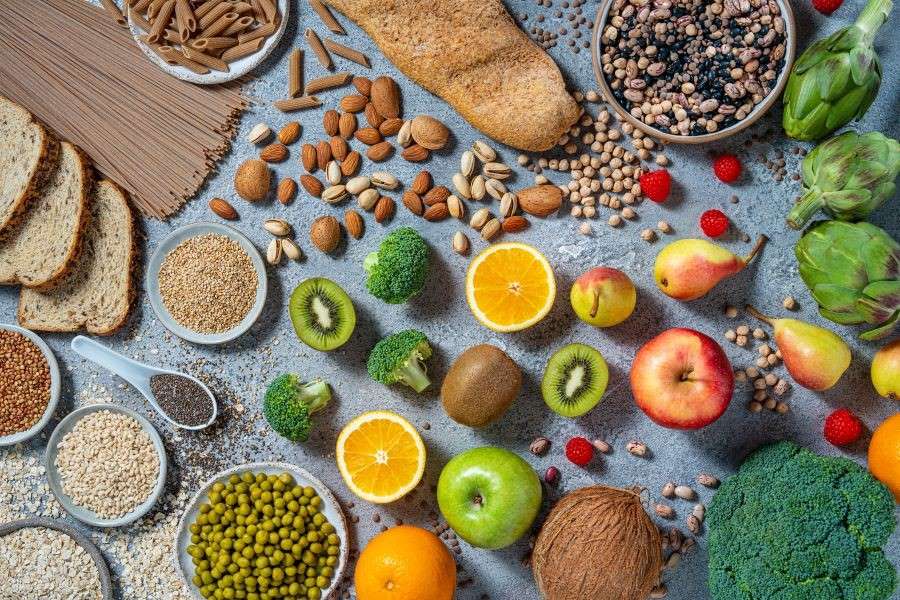
When we talk about macronutrients — protein, fat and carbohydrates — fiber is often overlooked. But it shouldn’t be. Fiber is a type of carbohydrate, and unlike sugars and starches, most dietary fiber is not digested or absorbed for energy. Instead, it stays in your intestines, where it helps modulate digestion and affects how your body processes other foods.
Let’s talk about why fiber has earned its place as a true superfood.
What is fiber?
There are two kinds of fiber, both are important:
- Soluble fiber dissolves in water and forms a gel-like substance in your stomach. It’s fermented by bacteria in your large intestine and helps with cholesterol and blood sugar control.
Examples: Oats, oatmeal, barley, beans, lentils, peas, chickpeas, soybeans, chia seeds, avocado, sweet potatoes, psyllium husk, fiber supplements like Metamucil
- Insoluble fiber comes from plant cell walls and doesn’t dissolve in water. It functions more like a brush, adding bulk to your stool and promoting regular bowel movements.
Examples: Whole grain bread, whole grain pasta, crackers, brown rice, fruits and vegetables, flax seeds, wheat bran, nuts, green leafy vegetables
Best high-fiber foods to eat every day
If you’re reading a food label, you’ll want to look at the dietary fiber line. Some top fiber-rich foods include:
- Green split peas: 1 cup (dry) = 32 grams
- Fiber One cereal (if you're into cereal, this one is high in fiber): 1 cup = 27 grams
- Lentils: 1 cup (dry) = 16 grams
- Avocados: 1 avocado = 13.5 grams
- Black beans: 1 cup = 12 grams
- Quinoa: 1 cup (dry) = 12 grams
- Oat flour: 1 cup = 12 grams
- Chia seeds: 2.5 tablespoons = 10 grams
- Figs: 10 dried figs = 10 grams
- Sweet peas: 1 cup = 10 grams
- Red raspberries: 1 cup = 9 grams
- Artichokes: 1 artichoke = 7 grams
Top health benefits of fiber
So why are we talking about fiber in the first place? Because it’s helpful in so many conditions.
- Lowers cholesterol
Soluble fiber interferes with the absorption of dietary fat and cholesterol. It helps your body excrete cholesterol and even reduces how much cholesterol your liver produces.
Studies show that every 1 gram increase in soluble fiber can decrease LDL (bad cholesterol) by an average of 2.2 points. One study compared taking 15 grams of psyllium daily to doubling the dose of a statin drug — and the results were the same.
Whole grain oats, in particular, have one of the greatest effects on total cholesterol.
- Helps manage Type 2 diabetes
Soluble fiber reduces the risk of diabetes and lowers mortality in people who already have it. There’s a connection between fiber, the gut microbiome and insulin resistance. Fiber increases good gut bacteria, which reduces insulin resistance and leads to lower blood sugar levels.
It also slows the rate at which carbohydrates are absorbed, so you don’t get a big spike in blood sugar after meals. High-fiber foods tend to have a lower glycemic index, too.
- Supports healthy blood pressure
Fiber also helps reduce blood pressure (hypertension). Gut bacteria ferment fiber and produce short-chain fatty acids, which enter the bloodstream and lower blood pressure.
- Reduces the risk of heart disease and stroke
Soluble fiber helps reduce the risk of heart disease by about 15%. It works by improving cardiovascular risk factors like insulin levels, cholesterol and blood pressure.
High fiber intake is also linked with reduced stroke risk — and even lowers the risk of death in stroke survivors.
- Lowers the risk of colorectal cancer
The World Cancer Research Fund found that for every 10 grams of fiber added to your daily diet, the risk of colorectal cancer drops by 10%. Again, much of this benefit comes from the way fiber supports your gut microbiome.
There’s a specific benefit to wheat bran and whole grains when it comes to colorectal cancer prevention.
- Helps with weight and digestion
Fiber helps you feel full, which can help reduce how much you eat. It may help lower your overall calorie intake and support weight loss.
It’s also helpful for:
- Constipation: Insoluble fiber adds bulk and helps with regularity. It’s not a laxative, though — it works best as a daily preventive measure.
- Chronic diarrhea: Soluble fiber helps bulk the stool and make it easier to pass.
How much fiber do you need?
The recommendation is at least 25 to 30 grams of fiber per day for adults. But to qualify as a high-fiber diet, more than 30 grams daily is best.
The American Heart Association recommends:
- More than 28 grams per day for women
- More than 38 grams per day for men
If you’re not close to that yet, try increasing gradually — add 5 to 10 grams per week until you get there.
When should you avoid a high-fiber diet?
Fiber isn’t for everyone all the time. If you’re dealing with an acute bowel issue like a Crohn’s flare, ulcerative colitis flare or diverticulitis, you may need to limit fiber until symptoms calm down.
But for most people, fiber is incredibly beneficial.
Final thoughts: Why fiber is worth adding to your diet
Fiber might not seem flashy, but it’s one of the most powerful tools we have for better health. From lowering cholesterol to improving gut health and reducing chronic disease risk, fiber really is a superfood. So try adding more fiber-rich foods to your day — and watch your health improve, one bite at a time.
Find more nutrition tips.
As with all medical advice, consult your health care provider about what is right for you.
Need a provider? Find one near you and schedule an appointment online.

